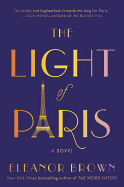
"Paris is always a good idea," Julia Ormond famously noted in the 1995 film version of Sabrina. For Margie Pearce, a shy, bookish debutante teetering dangerously close to spinsterhood in 1920s Washington, D.C., a trip to Paris comes at the right moment. After turning down a perfunctory and distinctly unappealing marriage proposal, Margie travels to Paris as chaperone to her willful young cousin, Evelyn. When Evelyn leaves the city with her bohemian friends and most of Margie's money, Margie defies her parents by deciding to stay in Paris alone and pursue her dream of becoming a writer. In her second novel, The Light of Paris, Eleanor Brown explores Margie's transformation and its far-reaching effect on her family, including her granddaughter Madeleine.
Brown (The Weird Sisters) begins her narrative in 1999, when Madeleine's frustration with her loveless marriage and unfulfilling life has reached the breaking point. During an impulsive visit to her childhood home, Madeleine unearths Margie's journals and letters from Paris. As she delves into this previously unknown facet of her grandmother's story, Madeleine wonders if she, too, can build a different life, one lived on her own terms instead of other people's.
Moving deftly between Madeleine's first-person voice and Margie's third-person narrative, Brown evokes the sensory images beloved by Francophiles: lush gardens, rich food and wine, elegant cafes buzzing with art and intellectual debate. But this isn't simply a retelling of the familiar American-in-Paris dream; it is a sensitive exploration of two women who feel trapped by the expectations of society and family. Très bien! --Katie Noah Gibson, blogger at Cakes, Tea and Dreams

